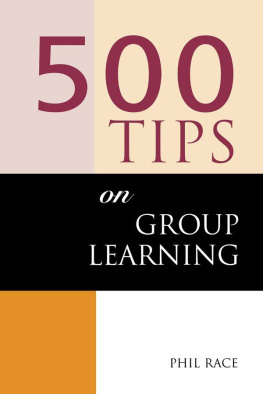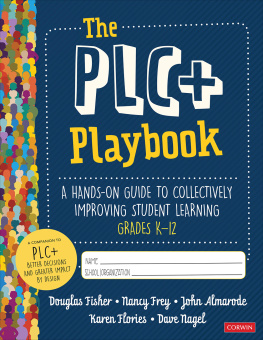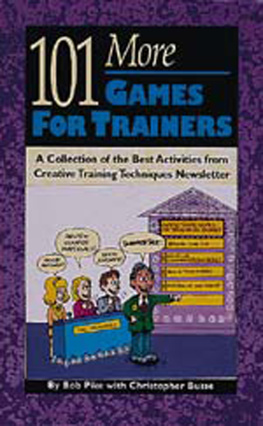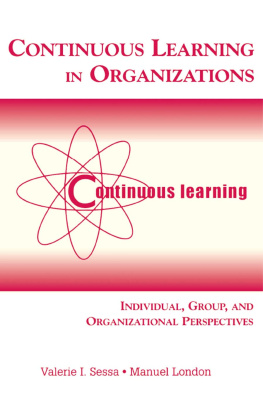Race - 500 Tips on Group Learning
Here you can read online Race - 500 Tips on Group Learning full text of the book (entire story) in english for free. Download pdf and epub, get meaning, cover and reviews about this ebook. City: Hoboken, year: 2014, publisher: Taylor & Francis (CAM), genre: Politics. Description of the work, (preface) as well as reviews are available. Best literature library LitArk.com created for fans of good reading and offers a wide selection of genres:
Romance novel
Science fiction
Adventure
Detective
Science
History
Home and family
Prose
Art
Politics
Computer
Non-fiction
Religion
Business
Children
Humor
Choose a favorite category and find really read worthwhile books. Enjoy immersion in the world of imagination, feel the emotions of the characters or learn something new for yourself, make an fascinating discovery.
500 Tips on Group Learning: summary, description and annotation
We offer to read an annotation, description, summary or preface (depends on what the author of the book "500 Tips on Group Learning" wrote himself). If you haven't found the necessary information about the book — write in the comments, we will try to find it.
Race: author's other books
Who wrote 500 Tips on Group Learning? Find out the surname, the name of the author of the book and a list of all author's works by series.
500 Tips on Group Learning — read online for free the complete book (whole text) full work
Below is the text of the book, divided by pages. System saving the place of the last page read, allows you to conveniently read the book "500 Tips on Group Learning" online for free, without having to search again every time where you left off. Put a bookmark, and you can go to the page where you finished reading at any time.
Font size:
Interval:
Bookmark:
TIPS
on
GROUP
LEARNING
PHIL RACE

First published 2000 by
Kogan Page Limited
Published 2013 by Routledge
2 Park Square, Milton Park, Abington, Oxon OX14 4RN
711 Third Avenue, New York, NY 10017, USA
Routledge is an imprint of the Taylor & Francis Group, an informa business
Phil Race, 2000
Apart from any fair dealing for the purposes of research or private study, or criticism or review, as permitted under the Copyright, Designs and Patents Act 1988, this publication may only be reproduced, stored or transmitted, in any form or by any means, with the prior permission in writing of the publishers, or in the case or reprographic reproduction in accordance with the terms of licences issued by the Copyright Licensing Agency.
British Library Cataloguing in Publication Data
A CIP record for this book is available from the British Library.
ISBN 0 7494 2884 8 ISBN 978-0-749-42884-6 (pbk)
Typeset by Jo Brereton, Primary Focus, Haslington, Cheshire
I am grateful to the many group members, in my various workshops on teaching, learning and assessment over the years, from whom I learnt a great deal about the facilitation of group learning. Staff from the European Business School, London, the University of Durham and the London School of Hygiene and Tropical Medicine helped to brainstorm the ideas on damaging behaviours in of this book, and for several other contributions, notably on ways of forming groups, handling conflict, gender issues and for providing very useful feedback on draft versions of this book. I thank Steve McDowell for his permission to use ideas on virtual groups from our 500 Computing Tips for Trainers, and Liz McDowell for her contribution on reflections on group work from 2000 Tips for Lecturers. I also thank Abby Day and John Peters for permission to adapt extracts from our 500 Tips for Developing a Learning Organization.
500 Tips from Kogan Page
500 Computing Tips for Teachers and Lecturers, 2nd Edition, Phil Race and Steve McDowell
500 Computing Tips for Trainers, Steve McDowell and Phil Race
500 ICT Tips for Primary Teachers, Steve Higgins, Nick Packard and Phil Race
500 Tips for Developing a Learning Organization, Phil Race, Abby Day and John Peters
500 Tips for Further and Continuing Education Lecturers, David Anderson, Sally Brown and Phil Race
500 Tips for Getting Published: a guide for educators, researchers and professionals, Dolores Black, Sally Brown, Abby Day and Phil Race
500 Tips for Open and Flexible Learning, Phil Race
500 Tips for Primary Teachers, Emma Packard, Nick Packard and Sally Brown
500 Tips for Quality Enhancement in Universities and Colleges, Sally Brown, Phil Race and Brenda Smith
500 Tips for Research Students, Sally Brown, Liz McDowell and Phil Race
500 Tips for School Improvement, Helen Home and Sally Brown
500 Tips for Teachers, 2nd Edition, Sally Brown, Carolyn Earlam and Phil Race
500 Tips for TESOL, Sue Wharton and Phil Race
500 Tips for Trainers, Phil Race and Brenda Smith
500 Tips for Tutors, Phil Race and Sally Brown
500 Tips for Working with Children with Special Needs, Betty Vahid, Sally Harwood and Sally Brown
500 Tips on Assessment, Sally Brown, Phil Race and Brenda Smith
Group learning is about getting people to work together well in carefully set up learning environments. The human species has evolved on the basis of group learning. Learning from other people is the most instinctive and natural of all the learning contexts we experience and starts at birth. Although learning can only be done by the learner, and can't be done to the learner, the roles of other people in accelerating and modifying that learning are vitally important. Other people can enhance the quality of our learning and can also damage it. But which other people?
We hear much of collaborative learning as if it's the most natural activity in the world. But it often seems like the least natural, particularly amongst strangers. Sociological research tells us repeatedly that it is human nature not to be involved with people we don't know. We might make a mistake, or look stupid or be attacked. We will, however, get involved with people we do know. We'll help them with their problems and even defend them. The key to working and learning with other people is, therefore, the ability to lower barriers and become friends with would-be strangers, while acknowledging differences and respecting different viewpoints.
This book is about how to facilitate group learning. We explore what we as facilitators can do to overcome the human condition regarding collaboration, as well as identifying the things that are most likely to go wrong in group contexts, so that tactics can be found which will add up to a strategy for enabling successful group learning to happen.
Much of the literature on education and training has over the years concentrated on particular roles of the people who support learning, notably teachers, trainers and lecturers, and on the learning resources that are devised to assist learning, notably textbooks, handouts, computer-assisted learning packages and the Internet. It can be argued that in the quest to make teaching and training effective, and to design appropriate learning resource materials, the potential of people learning from each other has been somewhat neglected.
Now, at a time when buzz phrases include learning organizations, lifelong learning and mass higher education, we need to face up to the importance of people learning from each other. Although sceptics will argue that most so-called learning organizations tend to be driven by the intended outcomes of the heads of organizations rather than of the individuals comprising them, and that lifelong learning is just another name for something that has always happened, the number of people who need to learn has grown in the rapidly changing world we now inhabit.
Furthermore, much is now said about transferable skills, or key skills, particularly oral communication skills, problem-solving skills, self-organization skills and reflection. Many of these skills can only be learnt from, and with, other people and cannot be developed solely by reading and studying what others have written about them. It is now increasingly accepted that the most important outcomes of education and training are about developing people, and not just what people know or understand. Employers and managers plead for employees who are able to work well with others and organize themselves. As the population of our planet increases, the need for people who can work well together is just as paramount as for people who can coexist together in general.
Group learning has never been as important as it is now. Yet we are still in a world where most teachers, educators and trainers are groomed in instruction rather than facilitation. This collection of practical suggestions is intended as one small step in adjusting the balance towards facilitation rather than training.
Despite the increased status of group learning, there is nothing fundamentally new in people learning together. Therefore, in this book, you will find at least as many ideas that you are already practising (or exceeding) as you will ideas that you have not tried out in your own work. Nevertheless, it is my hope that now and then you will find suggestions you can take and adapt, to add new impetus to those aspects of your own work about facilitating group learning.
Next pageFont size:
Interval:
Bookmark:
Similar books «500 Tips on Group Learning»
Look at similar books to 500 Tips on Group Learning. We have selected literature similar in name and meaning in the hope of providing readers with more options to find new, interesting, not yet read works.
Discussion, reviews of the book 500 Tips on Group Learning and just readers' own opinions. Leave your comments, write what you think about the work, its meaning or the main characters. Specify what exactly you liked and what you didn't like, and why you think so.









